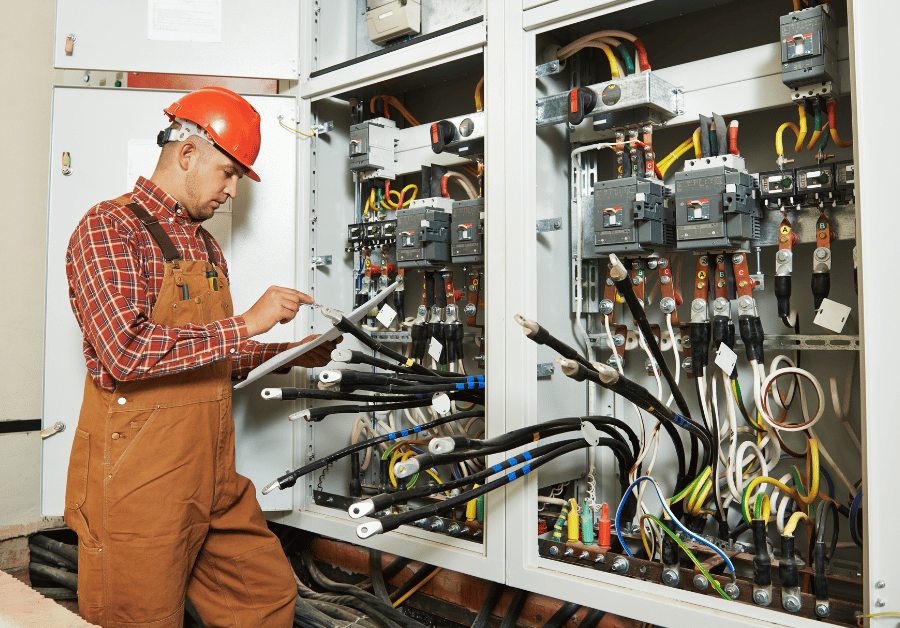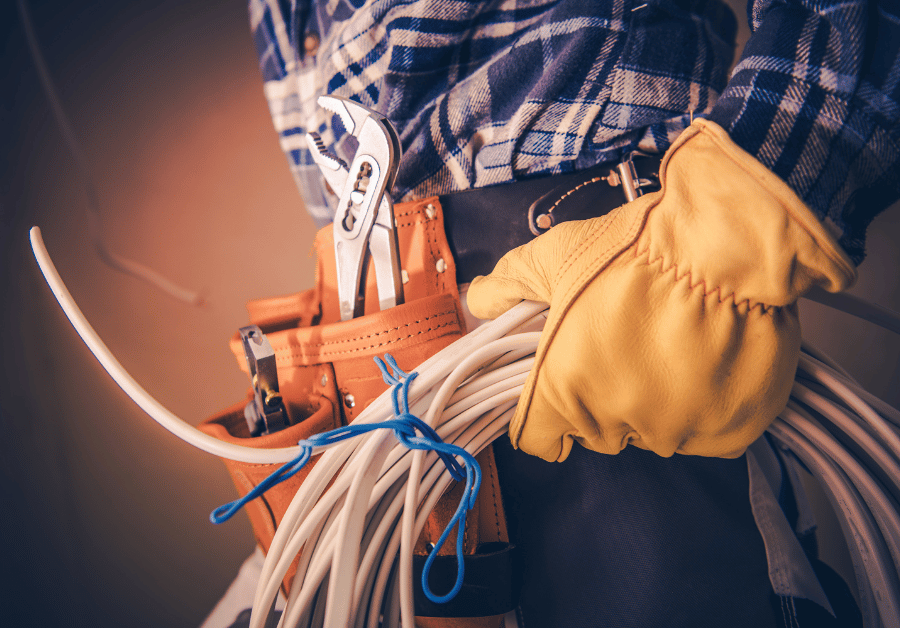Data Cabling Electrician Near Me: Your Australian Guide to Finding the Best
Struggling with dodgy internet or a slow network? In today's digital world, a reliable data connection is crucial, whether you're working from home in Sydney, running a business in Melbourne, or just trying to binge-watch your favourite shows in Brisbane. If your Wi-Fi is constantly dropping out, your smart home devices are lagging, or your office network is crawling, it might be time to consider professional data cabling. Searching for a data cabling electrician near me is the first step, but how do you find a good one in Australia?
Why You Need a Qualified Data Cabling Electrician
Before we dive into finding the right tradie, let's understand why professional data cabling is important:
- Improved Network Speed and Reliability: Proper cabling ensures a stable and fast connection, minimising downtime and improving productivity.
- Future-Proofing Your Home or Business: Investing in quality cabling now can save you money and hassle in the long run as your technology needs evolve.
- Enhanced Security: Secure cabling can protect your data from unauthorised access and interference.
- Compliance with Australian Standards: A qualified electrician will ensure your cabling meets all relevant safety and regulatory requirements.
Trying to DIY data cabling is generally a bad idea. It's complex, potentially dangerous, and often requires specialised tools and knowledge. A licensed electrician will have the expertise to do the job safely and correctly.
Where to Find a Reputable Data Cabling Electrician Near You
Okay, so you know you need a pro. But where do you start your search? Here are some tips for finding a reliable data cabling electrician in Australia:
- Ask for Recommendations: Talk to friends, family, neighbours, or colleagues who have recently had data cabling work done. Word-of-mouth is often the best way to find trustworthy tradies.
- Use Online Directories: Platforms like Get3Quote connect you with local electricians. You can compare quotes and read reviews to make an informed decision.
- Check Licensing and Insurance: Ensure the electrician is licensed to perform electrical work in your state or territory and has adequate insurance coverage. This protects you if something goes wrong during the job.
- Read Online Reviews: Check online reviews on sites like Google, Facebook, and other review platforms to get an idea of the electrician's reputation and customer satisfaction.
- Get Multiple Quotes: Don't settle for the first quote you receive. Getting at least three quotes allows you to compare prices and services and choose the best option for your budget and needs. Get 3 Free Quotes here
Questions to Ask Potential Electricians
Once you've shortlisted a few potential electricians, it's time to ask some important questions:
- Are you licensed and insured? (Always verify this!)
- What experience do you have with data cabling? (Look for specific experience with the type of cabling you need.)
- What types of cabling do you install? (Cat5e, Cat6, Cat6a, fibre optic – understand your options.)
- Do you offer a warranty on your work? (A good electrician will stand behind their work.)
- Can you provide references from previous clients? (Follow up on these references!)
- What is your estimated timeframe for the project?
- Can you provide a detailed quote outlining all costs? (Make sure there are no hidden fees.)
Understanding Data Cabling Types
Different types of data cables offer varying levels of performance and are suitable for different applications. Here's a quick overview:
- Cat5e: Suitable for basic networking and internet access.
- Cat6: Offers faster speeds and better performance than Cat5e, ideal for demanding applications like video streaming and online gaming.
- Cat6a: Provides even higher speeds and improved noise reduction, suitable for businesses and homes with high bandwidth requirements.
- Fibre Optic: Offers the fastest speeds and longest distances, ideal for large businesses and data centres.
Your electrician can help you determine the best type of cabling for your specific needs and budget.
Cost of Data Cabling in Australia
The cost of data cabling can vary depending on several factors, including:
- Type of cabling: Fibre optic cabling is generally more expensive than Cat5e or Cat6.
- Length of cable runs: Longer cable runs will require more materials and labour.
- Complexity of the installation: Difficult installations, such as those requiring work in tight spaces or through multiple walls, will typically cost more.
- Location: Prices may vary depending on your location in Australia. Electricians in major cities like Sydney and Melbourne may charge higher rates than those in regional areas.
As a general guide, you can expect to pay anywhere from $80 to $200 per data point (cable outlet) installed. It's always best to get a detailed quote from a qualified electrician to get an accurate estimate for your project. Using Get3Quote is the easiest way to compare pricing and find the best deal for your needs.
Data Cabling for Homes vs. Businesses
The requirements for data cabling can differ significantly between homes and businesses:
- Homes: Typically require fewer data points and less complex installations. Focus is often on providing reliable internet access for personal devices and entertainment systems.
- Businesses: Often require a larger number of data points to support multiple computers, printers, and other network devices. May also require more sophisticated cabling solutions, such as fibre optic, to support high bandwidth applications and ensure network security.
Make sure you choose an electrician who has experience with the type of cabling required for your specific needs, whether it's for your home office or a large commercial building. Find experienced professionals near you.
The Importance of Proper Data Cable Management

Data cable management is often overlooked, but it's crucial for maintaining a clean, organised, and efficient network. Proper cable management can help prevent tangling, reduce the risk of damage, and make it easier to troubleshoot problems. Your electrician should be able to provide solutions for cable management, such as cable trays, ties, and labels.
Staying Safe During Data Cabling Installation
Safety should always be a top priority during data cabling installation. Here are some important safety considerations:
- Turn off the power: Always turn off the power to the area where the work is being done to prevent electric shock.
- Wear appropriate safety gear: Wear safety glasses, gloves, and other protective gear as needed.
- Use the right tools: Use the correct tools for the job to avoid damaging the cables or injuring yourself.
- Follow all safety regulations: Adhere to all relevant safety regulations and guidelines.
A qualified electrician will be trained in safe work practices and will take all necessary precautions to ensure the safety of themselves and others. Hire a professional for safe installations.
Future-Proofing Your Data Cabling
Technology is constantly evolving, so it's important to future-proof your data cabling as much as possible. Consider installing higher-grade cabling than you currently need to accommodate future bandwidth requirements. Also, plan for future expansion by installing extra data points in strategic locations. Plan for the future.
Finding a Data Cabling Electrician in Specific Australian Cities
Let's look at some specific Australian cities and how to find data cabling electricians in those areas:
- Sydney: Search online directories like Get3Quote for data cabling electrician Sydney Look for electricians with experience in residential or commercial cabling, depending on your needs.
- Melbourne: Similar to Sydney, use online directories and search for data cabling electrician Melbourne Consider factors like proximity to your location and customer reviews.
- Brisbane: Search for data cabling electrician Brisbane and compare quotes from multiple electricians. Check their licensing and insurance before hiring.
- Perth: Look for electricians who specialise in data cabling in Perth. Consider their experience with different types of cabling, such as fibre optic.
- Adelaide: Find local electricians in Adelaide who offer data cabling services. Check their online reviews and ask for references.
- Hobart: Search for data cabling electrician Hobart and compare quotes. Make sure they are familiar with local building codes and regulations.
- Question 1: How much does data cabling cost in Australia?On average, you can expect to pay between $80 and $200 per data point, depending on the type of cabling, the length of cable runs, and the complexity of the installation. Fibre optic cabling generally costs more than Cat5e or Cat6.Question 2: Do I really need a licensed electrician for data cabling?Yes. In Australia, data cabling must be installed by a licensed and insured electrician to meet safety standards and regulations. DIY cabling can be unsafe, may not comply with Australian codes, and could void insurance or warranties.
Common Data Cabling Problems and How to Fix Them
Even with professional installation, data cabling problems can sometimes occur. Here are some common issues and how to address them:
- Slow internet speed: Check your modem and router first. If the problem persists, there may be an issue with your cabling.
- Intermittent connection: This could be caused by loose connections, damaged cables, or interference.
- Network downtime: This could be due to a variety of factors, including faulty hardware, software problems, or a physical break in the cabling.
In most cases, it's best to call a qualified electrician to diagnose and fix data cabling problems. They have the tools and expertise to identify the root cause of the issue and implement the appropriate solution. Find experts to troubleshoot your cabling.
Finding the right data cabling electrician in Australia doesn't have to be a headache. By following these tips and doing your research, you can ensure you get a reliable and professional service that meets your needs and budget. Don't settle for slow internet or unreliable network connections – invest in quality data cabling and enjoy a seamless digital experience.
